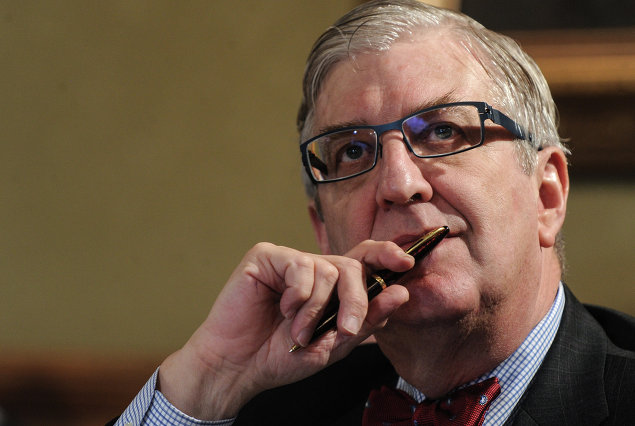 So a quick trip to Moscow! Moscow you say – in December? Yes indeed. Russia took over hosting of the G20 Leaders Summit on December 1, 2012 and decided to declare a kind of G20 ‘Party’ of sorts. To initiate Russia’s leadership in organizing the agenda for the G20 and to then actually host the G20 Leaders Summit in September in St. Petersburg, the Russian President and Russian officials called for a Sherpa meeting for December 11th but added additionally a B20 meeting, a Think20 meeting and a civil society. There was much ‘hustle and bustle’ of the G20 sort.
So a quick trip to Moscow! Moscow you say – in December? Yes indeed. Russia took over hosting of the G20 Leaders Summit on December 1, 2012 and decided to declare a kind of G20 ‘Party’ of sorts. To initiate Russia’s leadership in organizing the agenda for the G20 and to then actually host the G20 Leaders Summit in September in St. Petersburg, the Russian President and Russian officials called for a Sherpa meeting for December 11th but added additionally a B20 meeting, a Think20 meeting and a civil society. There was much ‘hustle and bustle’ of the G20 sort.
And of course lot’s of thinking! This from all the gatherings including the G20 business, civil society groups now identified as the C20 and experts from the G20 think tanks. I couldn’t resist, therefore, picturing all that thinking. So there I am on the official Russian website – presumably thinking quite a bit.
Now the Russian President in his first remarks as G20 Host struck this very broad consultative cord – which G20 leader hasn’t – but here is President Putin:
Russia is ready for the broadest possible cooperation on reaching the G20’s objectives. In order to make the G20’s work more effective and transparent and increase trust in what it is doing, we will hold the broadest consultations with all interested parties, with countries not part of the G20, and also with international, expert and trade union organisations, and business community, civil society and youth representatives. Practice shows that global measures are only effective when they are based on the views and take into account the interests of different groups.
All right so broad consultation it is. But where are the Russians hoping to take the agenda for the G20 leaders summit? In his remarks President Putin identified Russia’s G20 priorities:
- Growth through Quality Jobs and Investment;
- Growth through Effective Regulation; and
- Growth through Trust and Transparency in Markets
With these priorities, so the President claims, G20 policy progress will occur with further efforts on:
- A framework for strong, sustainable and balanced growth;
- Jobs and employment;
- International financial architectural reform;
- Reforming the currency and financial regulation and supervision systems;
- Energy sustainability;
- Development for all;
- Enhancing multilateral trade; and
- Fighting corruption.
And the President identified two additional issues on the financial agenda:
- Financing investment as a basis for economic growth and job creation; and
- Modernizing national public borrowing and sovereign debt management systems.
In a column from Sergey Strokan a Russian journalist posted by Russia’s RT titled, “Uphill battle: Russia at the helm of G20“, Strokan reports:
The key issue Russia’s G20 presidency needs to address is the restoration of investor confidence, adds Russia’s Finance Minister Anton Siluanov. In a situation, when economic growth in the locomotives of the world economy, including China, is still slowing down and the southern countries of the EU are in recession, global investor confidence is crucial for meeting the main global challenge of jump-starting economic growth, says Mr. Siluanov.
It appears the Russian Presidency hopes to hold – beyond the usual Sherpa and Finance Ministers and Central Bankers gatherings, a meeting of Finance and Labor Ministers as well as a meeting of Energy Ministers.
What can we make then of all of this? First, as usual there is far too much G20-speak; for the ordinary citizen from the G20 and beyond, this appears like a lot of ‘gobble y-guck’. It is hardly transparent to them. Even to the G20-types there is much vagueness and a lack of clarity over the specific policy objectives – probably to satisfy large and disparate interests in the G20. Then there appears to remain a conundrum at the heart of G20 policy – a key clash by G20 countries that appeared at the Toronto Summit – and remains to this day. That is which lever should G20 countries pull – the austerity and fiscal consolidation lever, or the stimulus lever. Now it is likely that the answer lies in timing and reflected in the specific conditions of various country budgets, job creation, debt accumulation and most critically economic growth. But the fiction remains of an overarching G20 policy agenda.
It would also appear that Russia can’t help but poke at the traditional economies with calls for monetary reform. What is urgently needed is a more serious discussion over currency manipulation whether China’s or the United States or now with a new Prime Minister in Japan. This is a tough issue but currency reform starts here.
And then there is hollowness of the consultation process. While it is valuable to encourage the various interests – business, think tanks, youth and labor – it lies rather uncomfortably with a government that still retains legislation that requires foreign-funded NGOs to declare themselves as “foreign agents”. It is dispiriting to witness this Janus-like behavior and the willingness of NGOs largely to ignore, this oppressive domestic behavior in the face of what appears a seat at the table – if a small one and far from the core table.
So the picture remains clouded but let’s see if the Russian presidency takes it upon itself to order transparency and accountability in the G20 agenda and policy process. There is time yet.
Image Credit: Official Russian Website of the G20.

